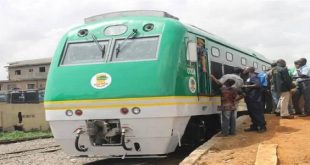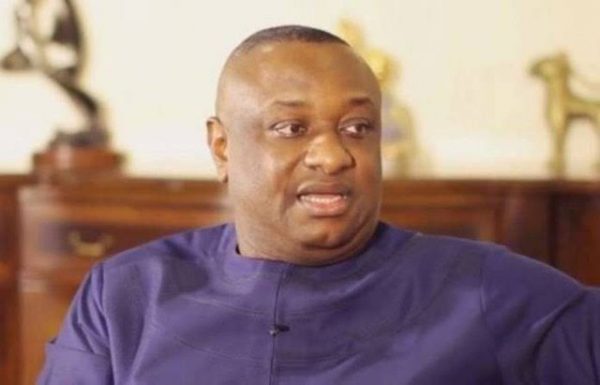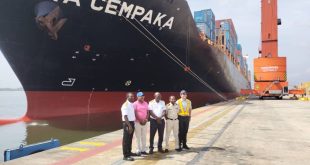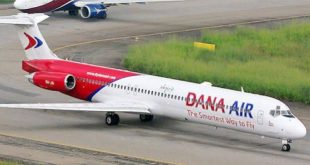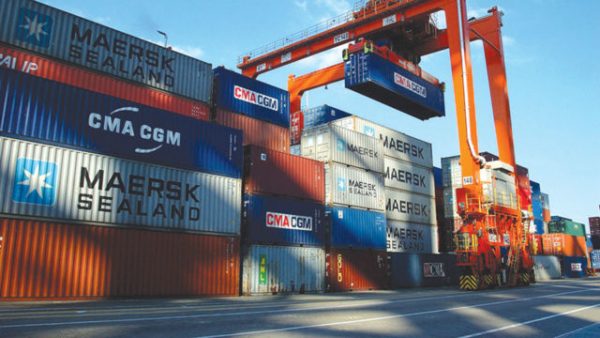 . No plan, no strategy for port sector growth
. No plan, no strategy for port sector growth
· Calabar Dredging: How NPA can generate N50bn

By Kenneth Jukpor
Nearly six months has passed since Togo attained hub-port status in West and Central Africa, yet Nigeria continues to slide downward as Benin and Cameroon lead in volume of Twenty Foot Equivalent Units(TEUs) and draft of deep seaports in the West African region.
Port of Lomé (PAL) in Lome, Togo is currently West Africa’s leading container port, snatching the position from Lagos, Nigeria in October, last year, after carrying out modernization reforms that tripled its capacity from 311, 500 containers in 2013 to almost 1.2 million TEUs in 2017, according toNetherland’s firm, Dynamar which provides intelligence and consultancy on maritime sector.

Dynamar reported that Nigeria’s Apapa Port in Lagos (1 million TEUs) lost 30% of its container traffic over five years due to chronic congestion and the poor quality of its services. Tema Port in Ghana with 0.95 million TEUs ranks 2nd, Nigeria is 3rd with 0.92 million TEUs, followed by Abidjan (0.66 million) TEUs 4th and Dakar (0.57 million) TEUs as 5th.

In 2017, Nigerian seaports accumulated a total of 922,706 TEUs according to the statistics provided by the Nigerian Ports Authority (NPA), yet the nation aspires to become the hub of port activities in the West African region.
With a depth of 16.60 meters, the Port of Lomé is the only deep-water port on the West African coast that can accommodate modern ships; while Onne port remains Nigeria’s deepest with 13 meters draft.
The population of Togo is barely 8 million with only 15% of the cargoes patronizing the Port of Lome destined for Togo, while over 75% is destined for the Nigerian market. Togo’s Port of Lome also services landlocked countries and it has also evolved as an important port with a free trade zone opened in 1968. It exports phosphates, coffee, cocoa, cotton and palm oil, much of the transit going to the neighbouring countries of Ghana, Mali, Niger and Burkina Faso. The port also holds an oil refinery.
During an exclusive chat withMMS Plus newspaper, the Chief Operating Officer, Ecomarine Terminals Limited, Mr. Adedayo Balogun, expressed worry as he lamented that Nigeria was doing nothing to show that it intends to be the hub of maritime activities in the region.
He stressed that the nation’s port sector agencies were unwilling to take critical decisions to transform the fortunes of the nation’s ports while Port of Lome, Tema Port in Ghana, as well as others in Benin and Senegal have been more strategic in developing their seaports for not just their economies but to also service landlocked countries.
“50% of the cargoes in the Port of Dakar are on transit to Mali, Tema Port in Ghana services the landlocked country of Burkina Faso. Cotonou services Niger Republic. Which nations do Nigerian ports service? We are busy losing cargoes to neighbouring countries,” he said.
Speaking further, Balogun said, “Today, the port of Douala is servicing the North Eastern part of Nigeria, which is supposed to be a captive market for Nigeria, if Calabar port was well developed. No container line calls at Calabar Port in spite of its captive market, availability of opportunities, proximity, inherent benefits and advantages that Calabar Port enjoys”
According to the Ecomarine boss, no Nigerian seaport can be classified as a hub port in the region as he stated that such status was occupied by the Ports in Togo, Ghana and Cameroon.
“Nigeria is almost two-third of the West-African population and by extension two-third of the sub-region’s market, yet it can’t boast of a hub port in West and Central Africa,” he said.
“Where is the development plan for the port sector in the country? Is there any? Is there a vision for the port industry? Can we really say we aspire to be a regional hub? If so, what is our strategy?” he asked rhetorically.
He also questioned NPA’s resolve to generate the N50billion needed to dredge the Calabar port channel as the Authority has not been held to account for its failure to uphold its end of the bargain by maintaining the draft of the port at 9.5 meters.
“There is the possibility of recouping the N50billion invested on dredging in three years. There are also several economic benefits for the host community and importers in this region while the port could easily become a hub port to service the North as well as neighbouring land-locked countries like Chad, Niger Republic and Cameroon” he said.
On the ongoing review of the concession agreement, Balogun applauded the Managing Director of NPA, Hadiza Bala-Usman for her courage to take up the exercise.
However, he maintained that new regime should reflect fairness, equity and justice in the entire operation of the concession regime. He called for the urgent establishment of National Transport Commission (NTC), which is expected to serve as the umpire to oversee the relationship between the lessor (NPA) and lessee (the concessionaires) in the concession agreement.
“The concession agreement gave responsibilities and obligations to both the lessor and the lessee, but it is easier for NPA as a lessor to have a monitoring and compliance unit to visit the ports and evaluate the extent of the compliance of concessionaires, but who monitors and evaluates the performance of NPA? Nobody. So, the absence of a neutral umpire makes it difficult for concessionaires not to be agitated about fairness, equity and justice in the entire operation of the concession regime. It is the duty of the authorities to ensure the emergence of NTC to ensure the oversight function on the entire concession regime and ensure that it is properly implemented to the benefit of the national economy,” he said.
Recall that NPA had estimated in October 2018 that over N50 billion was needed for the dredging of Calabar port; while the NPA Managing Director, Usman stressed that the revenue generated at Calabar port would determine whether the federal government would spend “a whopping N50billion on the Calabar port dredging”
Usman who disclosed this while presenting a paper titled; “Driving The Change Agenda Through Freight Forwarding,” at Prince Olayiwola Shittu Colloquium and Book Launch said that NPA was looking to see if the attendance revenue generation will justify such investment.
She said: “We are also exploring the utilization of the flat bottom vessels. These are vessels that can navigate and can come into the waterways without depth of dredge. Two of these vessels berthed in Calabar, which was historic.
“We are encouraging shipping companies to utilize such vessels as that would assist the Nigerian ports in having some vessels that does not require such level of investment (N50billion) in dredging” NPA Managing Director said.
Meanwhile, one of the importers operating in the area, Mr. Joseph Benson has said that importers are not happy about the poor state of the port.
He admonished NPA to take the necessary steps that would ensure the Calabar channel dredging contract is awarded and completed.
“We hope that this time around, the project will come to stay. This project is not about dredging of Calabar port channel; it has become a sentimental issue to importers and operators operating in the area are worried”, he said.
However, Benson expressed optimism that the completion of the project will boost the economy of the state, as most companies in Calabar depend on the port to realize their objectives.
Similarly, the President of the Cross Rivers State Shippers Association, Mr. Michael Ogodo, said the port is mainly doing liquid cargo, which has had little impact on the state’s economy. He said the attraction of container liners is paramount for the seaport to live up to expectations and enhance the well being of the indigenes.
“The kind of cargo they are doing in Calabar now is more of petroleum products. We do not have any regular scheduled cargo liner that is coming here. We don’t have it and that is what our clients, both exporters and importers are talking about. With the importation of this product, the tank farm owners are expanding their facilities; they are building more tank farms. I feel very sad because they do not add value to the local economy here,” he said.
Ogbodo urged the NPA to embark on dredging of the port, and create more conducive business environment that would encourage shippers and liners to patronize the port.
 MMS PLUS NG – Maritime, Aviation, Business, Oil and Gas News Online Newspaper with coverage in Maritime, Oil and Gas, Aviation, Power and Energy as well as Financial News
MMS PLUS NG – Maritime, Aviation, Business, Oil and Gas News Online Newspaper with coverage in Maritime, Oil and Gas, Aviation, Power and Energy as well as Financial News



